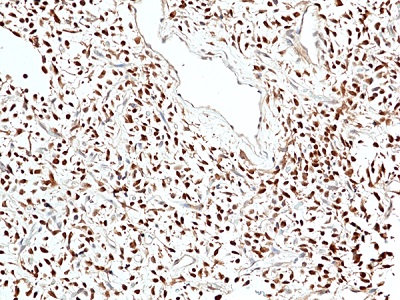anti-Stat6, Rabbit Monoclonal (RM473)
Product Code:
REV-31-1365-00
REV-31-1365-00
Host Type:
Rabbit
Rabbit
Antibody Isotype:
Rabbit IgG
Rabbit IgG
Antibody Clonality:
Recombinant Antibody
Recombinant Antibody
Antibody Clone:
RM473
RM473
Regulatory Status:
RUO
RUO
Target Species:
Human
Human
Applications:
- Immunohistochemistry (IHC)
- Western Blot (WB)
Shipping:
BLUE ICE
BLUE ICE
Storage:
Long term storage:-20°C.
Long term storage:-20°C.
No additional charges, what you see is what you pay! *
| Code | Size | Price |
|---|
| REV-31-1365-00-R100 | 100 ul | £455.00 |
Quantity:
Prices exclude any Taxes / VAT



